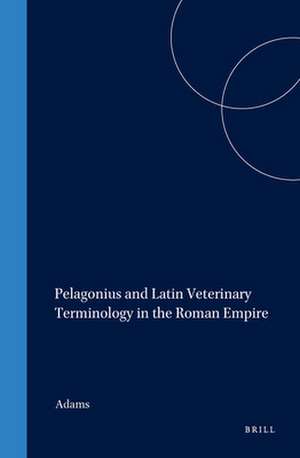Pelagonius and Latin Veterinary Terminology in the Roman Empire: Studies in Ancient Medicine, cartea 11
Autor Adamsen Limba Engleză Hardback – 30 iun 1995
Din seria Studies in Ancient Medicine
- 15%
 Preț: 366.53 lei
Preț: 366.53 lei - 18%
 Preț: 972.05 lei
Preț: 972.05 lei - 18%
 Preț: 1254.77 lei
Preț: 1254.77 lei - 18%
 Preț: 910.94 lei
Preț: 910.94 lei - 18%
 Preț: 1627.11 lei
Preț: 1627.11 lei - 18%
 Preț: 973.22 lei
Preț: 973.22 lei - 18%
 Preț: 971.34 lei
Preț: 971.34 lei - 18%
 Preț: 730.55 lei
Preț: 730.55 lei - 18%
 Preț: 972.22 lei
Preț: 972.22 lei - 18%
 Preț: 970.81 lei
Preț: 970.81 lei -
 Preț: 387.39 lei
Preț: 387.39 lei - 18%
 Preț: 1259.29 lei
Preț: 1259.29 lei - 18%
 Preț: 1258.74 lei
Preț: 1258.74 lei - 18%
 Preț: 1105.72 lei
Preț: 1105.72 lei - 18%
 Preț: 729.15 lei
Preț: 729.15 lei - 18%
 Preț: 818.56 lei
Preț: 818.56 lei - 18%
 Preț: 973.69 lei
Preț: 973.69 lei - 18%
 Preț: 973.93 lei
Preț: 973.93 lei - 18%
 Preț: 730.96 lei
Preț: 730.96 lei - 18%
 Preț: 1194.86 lei
Preț: 1194.86 lei - 18%
 Preț: 1035.43 lei
Preț: 1035.43 lei - 18%
 Preț: 640.71 lei
Preț: 640.71 lei - 18%
 Preț: 931.46 lei
Preț: 931.46 lei - 18%
 Preț: 907.90 lei
Preț: 907.90 lei - 18%
 Preț: 1440.79 lei
Preț: 1440.79 lei - 18%
 Preț: 716.90 lei
Preț: 716.90 lei - 18%
 Preț: 698.87 lei
Preț: 698.87 lei - 12%
 Preț: 808.33 lei
Preț: 808.33 lei - 5%
 Preț: 1017.78 lei
Preț: 1017.78 lei - 5%
 Preț: 1095.93 lei
Preț: 1095.93 lei - 18%
 Preț: 762.86 lei
Preț: 762.86 lei - 5%
 Preț: 884.69 lei
Preț: 884.69 lei - 18%
 Preț: 972.12 lei
Preț: 972.12 lei - 5%
 Preț: 914.69 lei
Preț: 914.69 lei - 5%
 Preț: 603.02 lei
Preț: 603.02 lei - 5%
 Preț: 463.00 lei
Preț: 463.00 lei - 18%
 Preț: 674.68 lei
Preț: 674.68 lei - 18%
 Preț: 570.86 lei
Preț: 570.86 lei - 18%
 Preț: 640.08 lei
Preț: 640.08 lei - 5%
 Preț: 734.44 lei
Preț: 734.44 lei - 15%
 Preț: 519.57 lei
Preț: 519.57 lei - 18%
 Preț: 600.53 lei
Preț: 600.53 lei - 18%
 Preț: 1486.50 lei
Preț: 1486.50 lei - 18%
 Preț: 584.62 lei
Preț: 584.62 lei - 18%
 Preț: 730.47 lei
Preț: 730.47 lei - 18%
 Preț: 730.72 lei
Preț: 730.72 lei
Preț: 1772.40 lei
Preț vechi: 2161.47 lei
-18% Nou
Puncte Express: 2659
Preț estimativ în valută:
339.14€ • 355.05$ • 280.62£
339.14€ • 355.05$ • 280.62£
Carte indisponibilă temporar
Doresc să fiu notificat când acest titlu va fi disponibil:
Se trimite...
Preluare comenzi: 021 569.72.76
Specificații
ISBN-13: 9789004102811
ISBN-10: 9004102817
Pagini: 695
Dimensiuni: 155 x 235 x 47 mm
Greutate: 0 kg
Editura: Brill
Colecția Brill
Seria Studies in Ancient Medicine
ISBN-10: 9004102817
Pagini: 695
Dimensiuni: 155 x 235 x 47 mm
Greutate: 0 kg
Editura: Brill
Colecția Brill
Seria Studies in Ancient Medicine
Public țintă
Those interested in the history of the Latin language, Latin linguistics, medical and veterinary history, medical and veterinary terminology and treatises in the Roman Empire, and Imperial social and agricultural history.Recenzii
'This is an imposing achievement, not only in terms of the size of the finished product, but much more in the breadth and depth of the material coverage - which are staggering - and in the lucidity, good sense and finality of the presentation, discussion and synthesis...This book is not for specialists only, far from it: it contains a mass of material and discussion on the use, welfare and treatment of animals, and on relations between their owners, keepers and healers - an important but neglected chapter of Roman social history; it offers an extraordinary number of instructive insights into the Latin language at various periods and registers; and it has much to say on topics of quite general relevance, such as stylometry, 'technical languages' in the ancient world, human medicine and magic, and the transmission of non-literary texts. In short, it is a book that every Latinist and Roman social historian can learn from and should know.'
D.R. Langslow, Bryn Mawr Classical Review, 1997.
'This is one of the most important books to have been published on ancient medicine for some time...This is a big book (almost a series of books, for even Adams admits to two) in every sense of the word.'
Vivian Nutton, Medical History, 1996.
'...il devrait figurer dans toutes les grandes biblioth~eques générales et dans les bibliothèques spécialisées.'
Danielle Gourevitch, l'Antiquite Classique, 1996.
D.R. Langslow, Bryn Mawr Classical Review, 1997.
'This is one of the most important books to have been published on ancient medicine for some time...This is a big book (almost a series of books, for even Adams admits to two) in every sense of the word.'
Vivian Nutton, Medical History, 1996.
'...il devrait figurer dans toutes les grandes biblioth~eques générales et dans les bibliothèques spécialisées.'
Danielle Gourevitch, l'Antiquite Classique, 1996.
Notă biografică
J.N. Adams, Ph.D. (1970), Oxford, F.B.A. (1992), is Professor of Latin in the University of Manchester. He has published extensively on Latin linguistics, particularly on sub- and non-literary varieties of the language.
